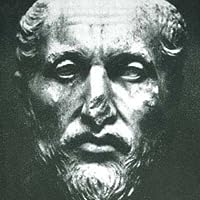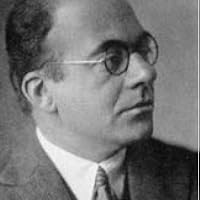Plotinus Quotes
Quotes tagged as "plotinus"
Showing 1-8 of 8

“When one has achieved the object of one's desires, it is evident that one's real desire was not the ignorant possession of the desired object but to know it as possessed--as actually contemplated, as within one.”
― The Essential Plotinus
― The Essential Plotinus

“This cause, therefore, of all existing things cannot be any one of them.”
― The Essential Plotinus
― The Essential Plotinus

“Fusing the doctrines of Plotinus and Proclus with the creeds and beliefs of Christianity, Dionysius the Pseudo-Areopagite combined the Neo-Platonic conviction of the fundamental oneness and luminous aliveness of the world with the Christian dogmas of the triune God, original sin and redemption. The universe is created, animated and unified by the perpetual self-realization of what Plotinus had called "the One," what the Bible had called "the Lord," and what he calls "the superessential Light.”
― Meaning in the Visual Arts
― Meaning in the Visual Arts

“Never did an eye see the sun unless it had first become sun-like, and never can the soul have vision of the First Beauty unless itself be beautiful.”
― Tangled Tides
― Tangled Tides

“The force that we invoke in The Way of Power IS the energy behind all manifestation. Another name for this energy is the 'Ontos' or the Essence of essences. The Ontos is the essential nature of anything. Plotinus, a Roman philosopher born in Egypt in 205 C.E., called this energy the First Hypostasis (literally, to cause to stand). What stands? The erection (the Point). What causes the erection? The Triangle (The Source of Mystery - Woman - that which causes to stand).”
― Beyond Duality: The Art of Transcendence
― Beyond Duality: The Art of Transcendence

“Plotinus (A.D. 205-270) was not a Christian, but his influence on Christian mystics was enormous; he compared human beings to the choir standing around a choir master but with their attention distracted by things going on about them, so they fail to sing in tune or in time. He held that creation was a series of steps leading away from the One (or God); he called those steps emanations. (The Kabbalists later borrowed his ideas, as William Blake was to borrow from the Kabbalah.) This is definitely a non-Christian view, for Plotinus’s evil is a negative thing, depending upon how many steps you have taken away from the One; it is like someone walking away from a lighted house at night, moving further into the darkness of the garden. But why should people walk away, unless tempted by the Devil? Because, says Plotinus, we are empty-headed, and easily distracted. The philosopher is the man who determinedly ignores distractions and multiplicity, and tries to see back towards the One. ‘Such,’ he concludes, ‘is the life of gods and of godlike men; a liberation from all earthly bonds, a life that takes no pleasure in earthly things, a flight of the alone to the alone.”
― The Occult
― The Occult

“They have been instructed by nature and the sacred laws to serve the living God, who is superior to the good, and more simple than the one, and more ancient than the unit; with whom, however, who is there of those who profess piety that we can possibly compare?”
― The Works of Philo
― The Works of Philo
All Quotes
|
My Quotes
|
Add A Quote
Browse By Tag
- Love Quotes 97k
- Life Quotes 75.5k
- Inspirational Quotes 72.5k
- Humor Quotes 43.5k
- Philosophy Quotes 29.5k
- Inspirational Quotes Quotes 27k
- God Quotes 26k
- Truth Quotes 23.5k
- Wisdom Quotes 23.5k
- Romance Quotes 23k
- Poetry Quotes 22k
- Death Quotes 20k
- Happiness Quotes 18.5k
- Life Lessons Quotes 18.5k
- Hope Quotes 18k
- Faith Quotes 18k
- Quotes Quotes 16.5k
- Inspiration Quotes 16.5k
- Spirituality Quotes 15k
- Religion Quotes 15k
- Motivational Quotes 15k
- Writing Quotes 14.5k
- Relationships Quotes 14.5k
- Life Quotes Quotes 14k
- Love Quotes Quotes 13.5k
- Success Quotes 13.5k
- Time Quotes 12.5k
- Motivation Quotes 12k
- Science Quotes 11.5k
- Knowledge Quotes 11k

